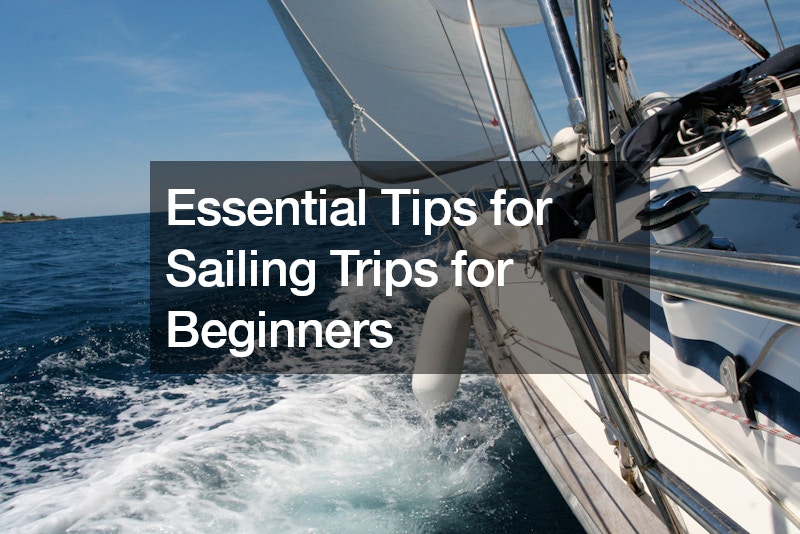
Setting sail for the first time can feel like steering into uncharted waters. It’s thrilling, sure, but also a bit daunting. Whether you dream about gliding across the sparkling sea or want to try something new, this article is your first mate. We’re here to share some essential tips for sailing trips for beginners. From picking the right boat to understanding the basics of navigation, we’ve got you covered. Don’t worry; we’ll keep it simple and straight to the point — no fancy jargon here. After all, the goal is to get you confidently trimming the sails, not scratching your head. Grab your life jacket; adventure awaits!
1. Bring a First-Aid Kit

Make sure to leave the dock with a first-aid kit; you’ll thank me later. Picture this: you’re out on your maiden voyage, the sun’s shining, the water’s crystal clear, and bam, you nick your finger while trying to master the art of tying a sailor’s knot. It’s not how you pictured things going. Well, that’s where a handy dandy first-aid kit stashed in the bathroom cabinet comes into play. Ensure it’s packed with all the essentials – bandages, antiseptic wipes, seasickness remedies, and pain relievers. Trust me, it’s better to have it and not need it than to need it and not have it.
Don’t just toss any old box into the bathroom cabinet and call it a day. Think about personal needs, too. Got allergies? Throw in some antihistamines. Prone to headaches when the waves start rocking the boat? Make sure you’ve got your preferred painkillers. The sea’s unpredictable, and so’s our health sometimes. Tailoring your kit to suit everyone on board isn’t just thoughtful; it’s smart. It’s like having a little health guardian angel right there with you.
Lastly, it’s not just about having a first-aid kit; knowing how to use it is key. Have you ever tried reading those tiny instructions in a pinch? Yeah, it’s not fun. Before you set sail, take a moment with your crew to familiarize yourselves with the contents. Maybe even run through a couple of ‘What if?’ scenarios. It’ll make a world of difference knowing you’re prepared for whatever the sea decides to throw your way. Plus, it’s a great way to bond with fellow sailors before the main adventure begins. Setting out on the open seas with confidence? That’s the goal, and being prepared is half the battle.
2. Don’t Litter
Who likes to sail through a sea of chemo waste or any trash, for that matter? It’s a big no-no, especially for those of us just starting to get the hang of sailing trips for beginners. Just imagine you’re out there, the wind in your hair, feeling at one with nature, and then you see it — a floating bottle or, worse, a bag of who-knows-what. It ruins the mood, right? Treat the ocean like you’d want your living room treated – with respect and no litter.
And it’s about more than just keeping the place looking neat. Tossing garbage overboard can seriously harm marine life. Think about it; no creature wants to live among old snack wrappers and soda cans. Plus, it’s super easy to avoid doing. Just bring a bag for your trash, keep it with you until you’re back on land, and dispose of it properly. You could even take it further and pick up any floating litter. Call it good karma, sailor’s honor, or whatever floats your boat. But trust me, doing your bit makes the whole experience way more rewarding.
3. Bring Only Essentials
Packing light’s the name of the game when you’re hitting the waters, especially for rookies on their first sailing trips for beginners. Trust me, you don’t want to haul stuff you won’t use. It’s all about sticking to the essentials. But hey, don’t confuse essentials with boring. You’d be surprised what counts as a must-have out on the open sea.
First, forget those bulky wooden crating solutions you might use for big moves. They’re overkill. Think compact and multi-use. During those lazy stargazing moments, a waterproof backpack can hold your gear and double as a makeshift pillow. And regarding gear, ensure you’re bringing items that serve multiple purposes. A sturdy water bottle, for example, is for more than just staying hydrated. It can also be a temporary buoy if you accidentally drop it overboard.
4. Have an Extra Energy Source

Having a reliable extra energy source on board isn’t just a good idea; it’s a no-brainer. When you’re miles away from the nearest propane service, the last thing you want is to find yourself in a pickle without power. Sure, most folks immediately think of propane for cooking and warmth, but other options might save your bacon, especially on sailing trips for beginners.
Solar chargers are real game-changers for those long stretches under the sun. They’re not just for charging your smartphone or camera either. On a sunny day, you can harness enough juice to power some of the essential gadgets on your boat, making sure you’re never left in the dark (quite literally). And don’t worry about them being too cumbersome. These days, solar chargers are lightweight and compact, slipping easily into your luggage without taking up precious space.
5. Visit Neat Shoreline Spots
Exploring neat shoreline spots isn’t just about snapping a few pics or checking out the local monument, especially when you’re on sailing trips for beginners. It’s about the adventure, the stories you’ll tell, and the memories you’ll make. When you finally dock and step onto the shore, you’re stepping into a new world just waiting for you to explore. Think about it: there’s so much more than typical tourist traps. You’ve got hidden beaches that aren’t on the map, secluded coves you’ve probably never heard of, and quaint little towns with the friendliest locals around.
Don’t just stick to the guidebook when looking for places to visit. Ask around. The folks sailing these waters for years know all the best spots. They’ll tell you where to find that perfect sunrise view or the quiet beach where sea turtles come to nest. Trust me, these encounters, these little gems, make a trip unforgettable. And don’t forget to keep an eye out for those off-the-beaten-path monuments — sometimes, the history of a place can be found in the most unexpected locations. Remember, it’s not just about the destination but the journey and the surprises along the way. Keep an open mind, and who knows? You might find your new favorite spot on the coast.
6. Prioritize Maintenance
When it comes to sailing trips for beginners, you have to think about keeping that boat in tip-top shape. Imagine setting out into the open sea, and something goes wrong because you skipped maintenance. Not cool, right? Finding a trustworthy mechanic should be at the top of your to-do list. These guys are like the unsung heroes of sailing. They know the ins and outs of every type of boat and can spot a problem from a mile away.
Now, it’s not just about routine check-ups. You also want to get your hands dirty. Well, not literally, but you get what I mean. Learning the basics of boat maintenance goes a long way. It’s all about prevention. Things like checking the hull for cracks or ensuring your sails are in good condition can save you many headaches. And don’t forget about your emergency equipment. Nothing screams ‘beginner’ more than being out without proper safety gear.
7. Put Safety First

Safety should always come first, no doubt about that. When planning sailing trips for beginners, think of it as setting up the ultimate adventure with a safety net underneath. Imagine chatting with a personal injury attorney before setting sail. Sounds pretty intense, right? But hey, they’d tell you the importance of being prepared for anything. It’s not about expecting the worst but about being ready so you can relax and enjoy the voyage.
Now, picture this – you’re miles from shore, the sun’s setting, and everything’s peaceful. You would want to make sure that you remember to pack essential safety gear. You’d want to kick back knowing you’ve got it all covered. Because there isn’t much a personal injury attorney can do for you in the middle of the ocean. That’s why investing in a solid safety course is a no-brainer. They’ll teach you the ropes, from dealing with minor injuries to making distress calls. Plus, it’s a fantastic way to meet fellow sailing newbies and learn some tricks.
8. Prepare for Bad Weather
Weather’s one of those things you really can’t ignore when you’re planning to take your adventures offshore. It’s unpredictable, changing faster than you can say ‘ waterproofing company.’ Now, think about it. You’re out there, maybe even enjoying your first few sailing trips for beginners, and bam, the skies darken. A chat with a good waterproofing company can make all the difference. They’ll hook you up with the right gear to keep you and your essentials dry, no matter what Poseidon throws at you.
But hey, it’s not just about keeping dry. Navigating bad weather takes a bit of know-how. You’ve got to watch those weather forecasts like a hawk. And I’m not just talking about a glance. Dig into those updates. Use apps, websites, and the old-school radio — use everything. Knowledge here is just as crucial as your sailing skills.
9. Learn the Basics of the Boat
Getting cozy with your boat is a must before you even think about setting sail. Consider this: Would you drive a car without knowing where the brakes are? The same goes for sailing. You wouldn’t want to be out on the water when it hits you and have no clue how to sail it. It’s like calling a handyman when you’ve accidentally put a hole in the wall; sure, they’ll fix it, but wouldn’t it be better if the wall remained intact in the first place?
Learning the ropes isn’t just about knowing what each part of the boat does, though that’s a biggie. It’s also about feeling the rhythms of the boat, how it responds to your commands, and what it feels like when everything’s running smoothly — or when it’s not. Imagine you’re on one of your first sailing trips as a beginner, and you know your boat like the back of your hand. That confidence? It’s unbeatable. You’ll be able to focus on soaking up the sun and the sea rather than fretting over every little sound or movement.
10. Keep Pests Out of Your Boat

Dealing with pests on your boat is a challenge you didn’t sign up for, but it comes with the territory. When you’re out enjoying those sailing trips for beginners, the last thing you want is uninvited guests. And I’m not talking about the in-laws popping by unannounced. No, these pests are sneakier and can cause trouble if you’re not careful. It’s best to call a pest control service for this.
First, keeping those pesky critters at bay isn’t just about comfort; it’s about maintaining your sanity and your boat’s integrity. Imagine setting sail, the sun shining, the water crystal clear, and then you spot them — ants marching one by one toward your picnic. Or worse, you hear the scurrying of tiny feet in the night. Cockroaches? Mice? Ugh, it’s like a scene from a horror flick.
Final Thoughts
To wrap up this article, sailing trips for beginners can truly be an exhilarating and unique experience, but they do come with their fair share of challenges. It’s all part of the adventure, from learning your boat’s ins and outs to keeping uninvited critters at bay. You’ll also eventually learn that there’s nothing quite like the thrill of your first few sailing trips out in the sea. Remember, it’s not just about avoiding pitfalls; it’s about enjoying the ride. And with a bit of preparation and the right attitude, you’ll find that the freedom of sailing is unlike anything else. Here’s to smooth seas and clear skies on your sailing journey. After all, there’s nothing quite like the feeling of conquering the waves confidently, right?


